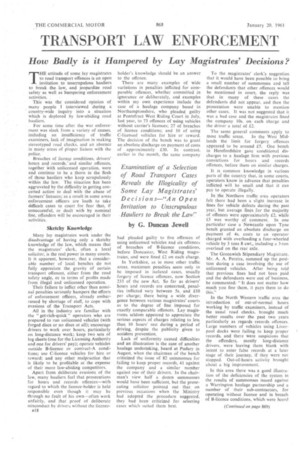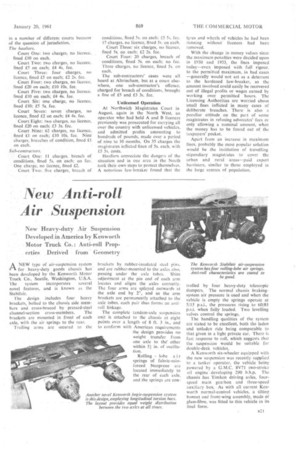TRANSPORT LAW ENFORCEMENT
Page 52

Page 55

If you've noticed an error in this article please click here to report it so we can fix it.
How Badly is it Hampered by Lay Magistrates' Decisions?
Examination of a Selection of Road Transport Cases Reveals the Illogicality of Some Lay Magistrates' Decisions—"An Open Invitation to Unscrupulous Hauliers to Break the Law" by G. Duncan Jewell THE attitude of some lay magistrates to road transport offences is an open invitation. to .unscrupulous hauliers to break •the law, and jeopardize road safety as well as hampering enforcement
activities. • This was the considered opinion of many people I interviewed during a country-wide inquiry into a . situation which is deplored by law-abiding road hauliers.
For some time after the war enforcement was slack from a variety of causes, including an insufficiency of traffic examiners, lack of imagination in making stereotyped road checks, and an absence in manyareas of Proper liaison with the police.
Breaches of licence conditions, drivers' hours and .records, and similar offences, together With unlicensed operation, were and continue to be a -thorn in the flesh of those hauliers who keep scrupulously within the law. The situation has been aggravated by the difficulty in getting concerted action to deal with the abuse of farmers' licences; as a result in some areas enforcement officers are loath to take difficult. cases to court for fear that, if unsuccessful, or dealt with by nominal fine, offenders will be encouraged in their activities.
Sketchy Knowledge
Many lay magistrates work under the disadvantage of having only a sketchy knowledge of the law, which means that the magistrates' clerk, often a local solicitor, is the real power in many courts. It is apparent, however, that a considerable number of local benches do not folly appreciate the gravity of certain transport offences, either from the road safety angle, or in terms of profits made from illegal and unlicensed operation.
Their failure to inflict other than nominal penalties seriously hampers the efforts of enforcement officers, already embarrassed by shortage of staff, to cope with evasions of the Transport Acts.
All in the industry are familiar with the " get-rich-quick " operators who are prepared to run unlicensed vehicles (with forged discs or no discs at all); encourage drivers to work over hours, particularly on long-distance work; keep two sets of log sheets (one for the Licensing Authority and one for drivers' pay); operate vehicles outside B-licence or contract-A conditions; use C-licence vehicles for hire or reward; and any other malpractice that is likely to be profitable at the expense of their more law-abiding competitors.
Apart from deliberate evasions. of the law, many hauliers feel that prosecutions for hours and records offences—with regard to which the licence-holder is held responsible even though it may be through no fault of his own—often work unfairly, and that proofof deliberate misconduct by drivers without the licence
RI8
holder's knowledge should be an answer to the offence.
There are many examples of wide variations in penalties inflicted for comparable offences, whether committed in ignorance or deliberately, and examples within my own experience include the case of a haulage company based in Northamptonshire, who pleaded guilty at Pontefract West Riding Court in July, last year, to 73 offences of using vehicles without carrier's licences; 27 of breaches of licence conditions; and 10 of using C-licensed vehicles for hire or reward. The decision of the bench was to grant an absolute discharge on payment of costs of approximately. £30. In contrast, earlier in the month, the same company
had pleaded guilty to five offences of using unlicensed vehicles and six offences of breaches of B-licence conditions, before Doncaster, West Riding magistrates, and were fined £2 on each charge.
In Yorkshire, as in most other traffic areas, maximum penalties seem only to be imposed in isolated cases, usually forgery of licence offences, now Section 233 of the new Act. So far as drivers' hours and records are concerned, penalties inflicted vary between 5s. and £10 per charge; there being a wide divergence between various magistrates' courts as to the degree of fine imposed for exactly comparable offences. Lay magistrates seldom appeared to appreciate the serious aspects of charges relating to less than 10 hours' rest during a period of driving, despite the publicity given to accident prevention.
Lack of uniformity caused difficulties and an illustration is the case of another haulage undertaking, heard at Pudsey in August, when the chairman of the bench criticized the issue of 82 summonses for failing to keep proper records, 41 against the company and a similar number against one of their drivers. In the chairman's view half a dozen summonses would have been sufficient, but the prosecuting solicitor pointed out that on previous occasions when the Ministry had adopted the. procedure suggested, they had been criticized for selecting cases which suited them best.
To the magistrates' clerk's suggestion that it would have been possible to bring a small number of summonses and tell the defendants that other offences would be mentioned in court, the reply was that. in many of these cases the defendants did not appear, and then the prosecution were unable to mention other cases, It was not suggested that it was a bad case and the magistrates fined the company 10s. oneach charge and the driver a total of £2.
The same general comments apply to most traffic areas. In the West Midlands the limit for forgery offences appeared to be around £5. One bench in Herefordshire gave conditional discharges to a haulage firm with previous convictions for hours and records offences, before them on similar charges.
It is common knowledge in various parts of the country that, in some courts, operators know in advance that penalties inflicted will be small–and that it can pay to operate illegally.
In die. Northern traffic. area operators felt there had been a slight increase in fines for vehicle defects during the past year; but average fines for the majority of offences were approximately £2, while £5 was worthy of . comment. In one particular case a •Newcastle upon Tyne bench granted an absolute discharge on payment of 4s. costs to an operator charged with overloading a four-wheeled vehicle by 3 tons 8 cwt., including a 3-ton overload on the rear axle.
The Greenwich Stipendiary Magistrate, Mr. A. A. Pereira, summed up the position during a case involving the use of unlicensed vehicles. After being told that previous fines had not been paid and the defendants were out of business, he commented: "It does not matter how much you fine them, it pays them to do this."
In the North Western traffic area the introduction of out-of-normal hours working by traffic examiners, instead of the usual road checks, brought much better results over the past two years particularly as regards records offences. Large numbers of vehicles using Liverpool docks were failing to keep proper records, and there were suspicions that the offenders, mostly long-distance drivers, were leaving them blank with intent to enter false records at a later stage of their journey, if they were not stopped. Out-of-hours activity brought about a big improvement.
In this area there was a good illustration of the deficiencies of the system in the results of summonses issued against a Warrington haulage partnership and a number of -their sub-contractors, for operating without licence and in breach of B-licence conditions, which were heard
in a number of different courts because of the question of jurisdiction, The hauliers.
Court One: two charges, no licence, fined £10 on each.
Court Two: two charges, no licence, fined XS on each; £4 4s, fee.
Court Three: four charges, no licence, fined £5 on each; £2 2s. fee.
Court Four: two charges, no licence, fined £20 on each; 1.10 10s. fee.
Court Five: two charges, no licence, fined 110 on each; £4 4s. fee.
Court Six: one charge, no licence, fined £10; £5 5s. fee.
Court Seven: seven charges, no licence, fined £2 on each: £4 4s. fee.
Court Eight: two charges, no licence, fined £20 on each; £3 3s. fee.
. Court Nine: 62 charges, no licence, fined 'Ll on each; £10 10s. fee. Nine charges, breaches of condition, fined £1 on each.
Sub-contractors.
Court One: 11 charges, breach of conditions, fined 5s. on each; no Ice. One charge, no licence, fined £2.
Court Two: ,five charges, breach of
conditions, fined 5s. on each; £5 5s. fee. 17 charges, no licence, fined 5s, on each. Court Three: six charges, no licence. fined 5s. on each; £2 2s. fee.
Court Four: 20 charges, breach of conditions, fined 5s. on each; no fee. Three charges, no licence, fined 5s. on each.
The sub-contractors' cases were all heard at Altrincham, but at a court elsewhere, one sub-contractor's offence, charged for breach of conditions, brought a fine of £5 and £3 3s. fee.
Unlicensed Operation
At Northwich Magistrates Court in August, again in the North West, an operator who had held A and B licences previously was prosecuted for carrying all over the country with unlicensed vehicles, and admitted profits amounting to hundreds of pounds, made Over a period of nine to 10 months. On 35 charges the magistrates indicted fines of 5s. each. with £5 5s. costs.
Hauliers. appreciate the dangers of the situation and in one area in the North took their own steps to protect themselves. A notorious law-breaker found that the tyres and wheels of vehicles he had been running without licerices had been removed.
With the change in money values since the maximum penalties were decided upon in 1930 and 1933, the fines imposed today—even imposed with full rigour, to the permitted maximum, in bad cases —generally would not act as a deterrent to the hardened law-breaker, as the amount involved could easily be recovered out of illegal profits or wages earned by working over permitted hours. The Licensing Authorities are worried about small fines inflieted in many cases of deliberate breaches. There is also a peculiar attitude on the part of some magistrates in refusing advocates' fees or only allowing. a nominal amount, when the money has to be found out of the taxpayer' pocket.
Apart from an increase in maximum fines, probably the most popular solution would be the institution of travelling stipendiary magistrates to cover the urban and rural -areas—paid expert banisters, similar to those .employed in the large centres Of population. .




















































































































